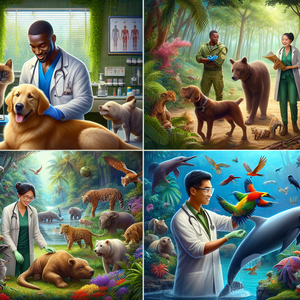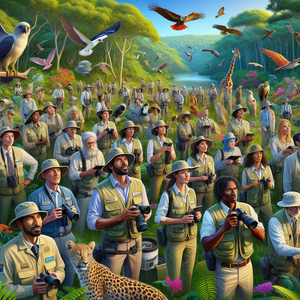
Discovering Your Calling: 20 Inspiring Animal Careers for Those Ready for a Change
In an era where many are seeking more meaningful work, the desire to engage with animals has surged. If you've ever felt a pull towards a career that allows you to connect with our furry, feathered, or finned friends, you’re not alone. This guide explores a variety of fulfilling paths in the animal care sector, including roles such as veterinarians, wildlife conservationists, and animal behaviorists, among others.
Job Summaries:
Veterinarian:
- Veterinarians play a pivotal role in maintaining animal health.
- Diagnosing ailments and providing treatments.
- Daily tasks may include performing surgeries.
- Conducting physical exams.
- Offering vaccinations.
- To enter this field, a Doctor of Veterinary Medicine (DVM) degree is essential.
- State licensure is also required.
Wildlife Biologist:
- Wildlife biologists delve into the behaviors, genetics, and ecosystems of animals in their natural environments.
- Their work involves field studies, data analysis, and advising on conservation strategies.
- A bachelor’s degree in biology or wildlife management is typically required.
Animal Care Specialist:
- Animal care specialists are responsible for the daily care of animals in shelters, zoos, and veterinary clinics.
- They manage tasks such as feeding, grooming, and habitat cleaning.
- A high school diploma may be sufficient for this role.
- Relevant experience with animals is often preferred.
Zoologist:
- Zoologists conduct research on animal behavior, physiology, and genetics, typically within academic or educational institutions.
- Their responsibilities include running experiments, analyzing data, and raising public awareness about wildlife conservation.
- A degree in zoology or a related field is generally required.
Animal Nutritionist:
- Focusing on the dietary needs of various animals.
- Animal nutritionists develop balanced diet plans to promote health.
- They research nutritional content.
- They work with pet owners and farmers to improve animal diets.
- A degree in animal science or nutrition is usually necessary.
Wildlife Conservationist:
- Wildlife conservationists work to protect endangered species and their habitats through research and community engagement.
- They conduct surveys and develop programs aimed at conservation.
- A degree in environmental science or biology is often required.
Animal Control Officer:
- Animal control officers enforce laws regarding animal welfare.
- Rescue strays or abused animals.
- Educate the public on responsible pet ownership.
- Capture stray animals.
- Investigate cases of cruelty.
Veterinary Technician:
- Veterinary technicians assist veterinarians in diagnosing and treating animals.
- They perform tasks such as taking X-rays and administering medications.
- An associate degree in veterinary technology is required.
- State licensure is required.
Animal-Assisted Therapist:
- Incorporating animals into therapeutic practices
- Animal-assisted therapists help enhance clients' emotional and physical well-being
- Developing treatment plans
- Conducting animal-assisted sessions
Dog Trainer:
- Dog trainers teach obedience and behavioral skills to dogs and their owners.
- Tasks involve creating training programs and leading classes.
- While formal education isn't always necessary, certification from an accredited program can enhance job prospects.
Animal Shelter Manager:
- Animal shelter managers oversee daily operations.
- They manage staff and fundraising efforts.
- Responsibilities include budgeting and community outreach.
- A degree in animal science or business administration is often preferred.
Farm Animal Caretaker:
- Farm animal caretakers oversee livestock management
- Focus on feeding and health monitoring
- A high school diploma is typically required
- Experience with farm animals is typically required
Animal Behaviorist:
- Studying and improving the interactions between animals and humans
- Animal behaviorists develop treatment plans for behavioral issues
- A degree in psychology or animal science is necessary
- Hands-on experience is necessary
Equine Specialist:
- Equine specialists are dedicated to the care and training of horses.
- They often work in stables or therapeutic programs.
- Their tasks may include grooming and conducting riding lessons.
Pet Adoption Counselor:
- Pet adoption counselors assist families in finding suitable pets.
- They provide education on responsible pet ownership.
- Responsibilities include conducting interviews.
- They organize outreach events.
Aquarist:
- Aquarists are responsible for caring for marine animals in aquariums.
- They perform tasks such as feeding and monitoring water quality.
- A degree in marine biology is often preferred.
Pet Groomer:
- Pet groomers provide grooming services, including bathing and nail trimming.
- Certification isn't always required.
- Experience and knowledge of animal handling are crucial.
Wildlife Rehabilitation Specialist:
- Wildlife rehabilitation specialists care for injured wild animals.
- They offer medical treatment and rehabilitation.
- A background in wildlife biology or veterinary medicine is often necessary.
Animal Shelter Volunteer Coordinator:
- Volunteer coordinators manage the volunteer programs at shelters.
- Recruiting and training volunteers is a key responsibility.
- A background in human resources can be beneficial.
- A background in animal care can be beneficial.
Pet Sitting/Dog Walking Service Owner:
- Starting a pet-sitting or dog-walking business allows for flexible work.
- Caring for pets in their homes is a key aspect of the business.
- Formal education isn't necessary for this line of work.
- A passion for animals is essential.
- Knowledge of pet care is important.
Embarking on a journey in animal care can be immensely gratifying. This guide serves as a starting point for exploring the vast options available in this field. By combining education, hands-on experience, and genuine passion, career changers can carve out a path that aligns with their love for animals and their aspiration to effect change.
Explore More Jobs

